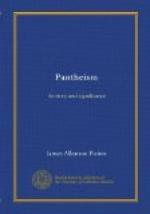[Sidenote: Love.]
Nor is this moral ideal without a sacred passion; at least to ordinary men; though it must be confessed that Spinoza, in the stillness of his sacred peace, ignored the word. But he still held that the larger our view of the Universe and of our communion therewith, the more we have of God in us and the more do we realize an “intellectual love” towards Him. That this in his case was no barren sentiment, but a genuine moral inspiration, was proved by his life; for truly “he endured as seeing Him who is invisible.” And it was not by faculties wholly wanting to smaller men that he did this. For though his intellect was in some respects almost beyond compare, it was rather by his self-subordinating contemplation that he was kept at peace. Indeed, he knew far less of the extended universe than our men of science do, and his doctrines of mind and thought are, by indisputable authorities, regarded as imperfect. But imagining what God must be, could we have an adequate idea not only of His Being—which Spinoza thought he had—but of His infinite attributes and their modes—which Spinoza recognized that he had not—he declared that love toward God was the very highest good. And it was supremely blessed in this, that it could engender no jealousy nor selfishness, nor sectarian zeal, but rather a large-hearted charity which would gather all mankind into the present heaven of that love.




